仁爱英语中考总复习计划
仁爱英语中考复习备考计划

仁爱英语中考复习备考计划As a student preparing for the Ren'ai English midterm exam, I have developed a comprehensive study plan to ensure I am fully prepared for the test. Here is my plan:Firstly, I will review all the English grammar rules and vocabulary that have been covered in class. This will involve going through my class notes, textbooks, and any supplementary materials provided by my teacher. I will also make use of online resources and practice exercises to reinforce my understanding of these concepts.In addition to grammar and vocabulary, I will also focus on improving my reading comprehension and writing skills. I plan to read a variety of English texts, including fiction, non-fiction, and news articles, in order to broaden my reading comprehension abilities. Furthermore, I will practice writing essays and short responses to prompts in order to strengthen my writing skills.To improve my listening and speaking abilities, I will make use of English audio and video materials. This will involve listening to various English accents and engagingin spoken English practice with classmates or language exchange partners.In order to track my progress and ensure that I am on the right track, I will take regular practice tests and quizzes. This will help me identify any areas of weakness that need further attention, and allow me to gauge my overall improvement over time.Finally, I will make use of any study resources provided by my teacher, such as review sessions or study guides. I will also seek help from my teacher or classmates if I encounter any difficulties or have any questions about the material.通过以上学习计划,我相信我将会在仁爱英语中考中取得优异的成绩。
仁爱英语初中中考总复习模板计划总结计划模板计划模板学习的学习的资料.docx

初三英语总复习笔记七年级(上)Unit 1复习要点短语和句子1、 Good morning/ Good afternoon / evening . 早上 /下午 /晚上好2、 (It’ s) Nice to meet/see you. = (It’ s)Good to meet/see you.= (I’ m) Glad to meet/see you= (I’ m) Pleased to meet/see you= (I’ m) Happy to meet/see很高兴见you到你.3、 Welcome to China欢迎到中国来.4、Thanks /Thank you .谢谢5、 You’ re welcome ./ That’ s all right不(OK)用谢,.6、Stand up .起立Sit down . 坐下7、 This is介..绍第三者的用语,复数用These are8、 How do you do ?您好9、 How are you ? 您好吗?How is she\he? 她他好吗?10、 I ’ m fine 我.很好。
11、 What’s your/his /her name ?= May I know/have your/his /her name?Could you please tell me your/his /her name? 你 /他 /她叫什么名字?12、 My name is Jane . 我名叫简13、 Where are you from ? = Where do you come from? Where is he/she from?= Where does he/she come from?你 /他 /她/他们来自哪里?14、 I am / He (She) is /They are from Canada/Japan/the U.S.A/England/Cuba/China.我 /他 /她 /他们来自加拿大 / 日本 /美国 /英古巴 /中国。
仁爱英语中考备考计划

仁爱英语中考备考计划**Title: The Journey to Mastering the Ren'ai English Exam**As the countdown to the Ren'ai English exam begins,it's crucial to have a solid study plan to ensure success. This plan outlines a comprehensive approach to prepare for the exam, focusing on key areas such as vocabulary, grammar, reading comprehension, and writing skills.**Vocabulary Mastery**The foundation of any language exam is vocabulary. Therefore, it's essential to dedicate regular time to expanding and reviewing one's word bank. Creating a daily vocabulary list, with new words and their definitions, is a great way to start. Additionally, using these words in sentences or short paragraphs helps solidify their meaning and usage.**Grammar Reinforcement**Grammar is another crucial aspect of the exam. Understanding and applying the correct grammar rules is essential for scoring well. Regular practice throughexercises, quizzes, and grammar-focused lessons is necessary to solidify these rules.**Reading Comprehension**Reading comprehension requires not only fluent reading skills but also the ability to analyze and interpret text. Regular practice with passages and comprehension questions helps develop these skills. It's also important to read a variety of materials, including newspapers, novels, and online articles, to expose oneself to different writing styles and topics.**Writing Skills Development**The writing section of the exam tests not only vocabulary and grammar but also创意和组织能力。
仁爱版初中英语中考复习计划
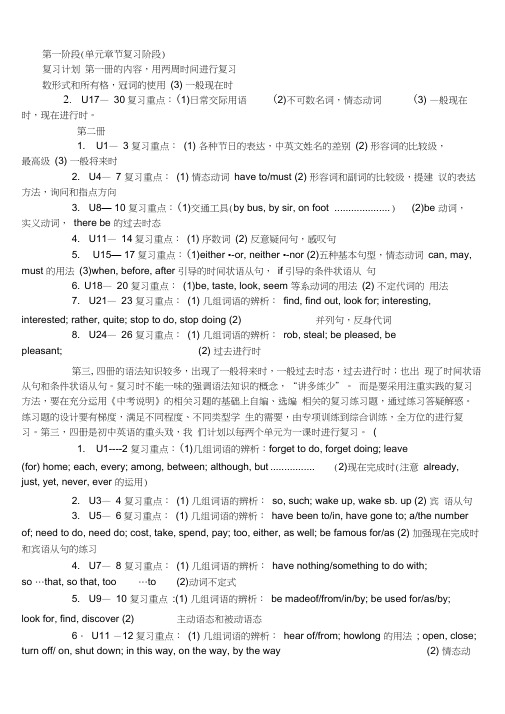
第一阶段(单元章节复习阶段)复习计划第一册的内容,用两周时间进行复习数形式和所有格,冠词的使用(3) 一般现在时2.U17—30复习重点:(1)日常交际用语(2)不可数名词,情态动词(3) —般现在时,现在进行时。
第二册1. U1—3 复习重点:(1) 各种节日的表达,中英文姓名的差别(2) 形容词的比较级,最高级(3) 一般将来时2. U4—7 复习重点:(1) 情态动词have to/must (2) 形容词和副词的比较级,提建议的表达方法,询问和指点方向3. U8— 10 复习重点:(1)交通工具(by bus, by sir, on foot .................... )(2)be 动词,实义动词,there be 的过去时态4. U11—14复习重点:(1) 序数词(2) 反意疑问句,感叹句5. U15— 17复习重点:(1)either •-or, neither •-nor (2)五种基本句型,情态动词can, may, must 的用法(3)when, before, after 引导的时间状语从句,if 引导的条件状语从句6. U18—20 复习重点:(1)be, taste, look, seem 等系动词的用法(2) 不定代词的用法7. U21—23 复习重点:(1) 几组词语的辨析:find, find out, look for; interesting,interested; rather, quite; stop to do, stop doing (2) 并列句,反身代词8. U24—26 复习重点:(1) 几组词语的辨析:rob, steal; be pleased, bepleasant; (2) 过去进行时第三, 四册的语法知识较多,出现了一般将来时,一般过去时态,过去进行时;也出现了时间状语从句和条件状语从句。
复习时不能一味的强调语法知识的概念,“讲多练少”。
仁爱英语中考总复习计划
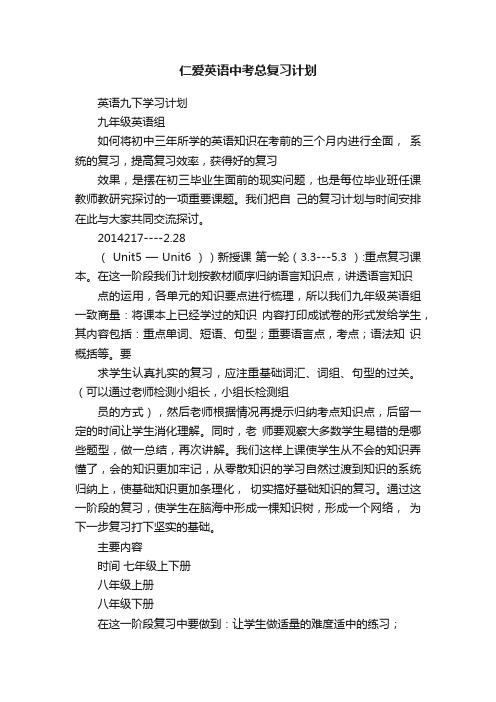
仁爱英语中考总复习计划英语九下学习计划九年级英语组如何将初中三年所学的英语知识在考前的三个月内进行全面,系统的复习,提高复习效率,获得好的复习效果,是摆在初三毕业生面前的现实问题,也是每位毕业班任课教师教研究探讨的一项重要课题。
我们把自己的复习计划与时间安排在此与大家共同交流探讨。
2014217----2.28( Unit5 — Unit6 ))新授课第一轮(3.3---5.3 ):重点复习课本。
在这一阶段我们计划按教材顺序归纳语言知识点,讲透语言知识点的运用,各单元的知识要点进行梳理,所以我们九年级英语组一致商量:将课本上已经学过的知识内容打印成试卷的形式发给学生,其内容包括:重点单词、短语、句型;重要语言点,考点;语法知识概括等。
要求学生认真扎实的复习,应注重基础词汇、词组、句型的过关。
(可以通过老师检测小组长,小组长检测组员的方式),然后老师根据情况再提示归纳考点知识点,后留一定的时间让学生消化理解。
同时,老师要观察大多数学生易错的是哪些题型,做一总结,再次讲解。
我们这样上课使学生从不会的知识弄懂了,会的知识更加牢记,从零散知识的学习自然过渡到知识的系统归纳上,使基础知识更加条理化,切实搞好基础知识的复习。
通过这一阶段的复习,使学生在脑海中形成一棵知识树,形成一个网络,为下一步复习打下坚实的基础。
主要内容时间七年级上下册八年级上册八年级下册在这一阶段复习中要做到:让学生做适量的难度适中的练习;及时检测,即每复习完一部分后,上中午辅导期间要经行检测(可通过提问、默写、听写的办法),及时了解学生对所复习知识的掌握情况。
利用早读时间再次加强背诵。
老师要对学生总结不完整的知识点,加以补充完整;对学生易错的知识点,让学生练、考;对学生模棱两可的知识点,就要精讲细讲。
在每单元的知识归纳总结上,注意学生激发学生的发散思维, 3.3--3.11 3.12--3.26 3.27--4.13 九年级Unitsl-2 九年级Units3-4九年级 Units5-6 4.14- 4.21 4.22- 4.29 4.30 —5.3让他们做到“系统复习,整体把握,综合运用”。
仁爱英语初三总复习计划
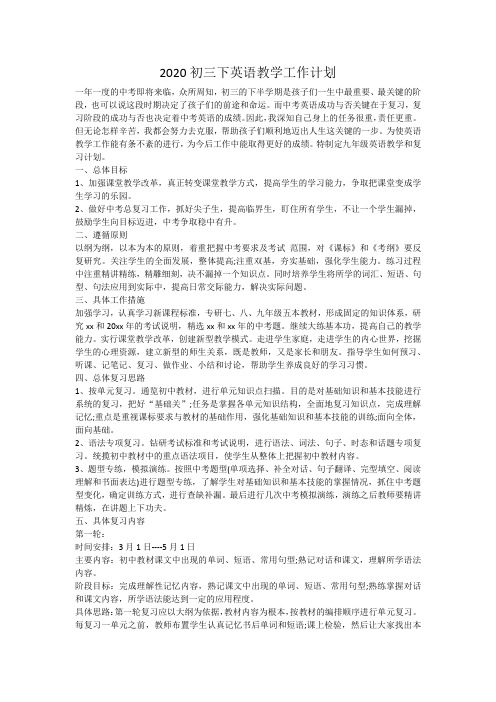
2020初三下英语教学工作计划一年一度的中考即将来临,众所周知,初三的下半学期是孩子们一生中最重要、最关键的阶段,也可以说这段时期决定了孩子们的前途和命运。
而中考英语成功与否关键在于复习,复习阶段的成功与否也决定着中考英语的成绩。
因此,我深知自己身上的任务很重,责任更重。
但无论怎样辛苦,我都会努力去克服,帮助孩子们顺利地迈出人生这关键的一步。
为使英语教学工作能有条不紊的进行,为今后工作中能取得更好的成绩。
特制定九年级英语教学和复习计划。
一、总体目标1、加强课堂教学改革,真正转变课堂教学方式,提高学生的学习能力,争取把课堂变成学生学习的乐园。
2、做好中考总复习工作,抓好尖子生,提高临界生,盯住所有学生,不让一个学生漏掉,鼓励学生向目标迈进,中考争取稳中有升。
二、遵循原则以纲为纲,以本为本的原则,着重把握中考要求及考试范围,对《课标》和《考纲》要反复研究。
关注学生的全面发展,整体提高;注重双基,夯实基础,强化学生能力。
练习过程中注重精讲精练,精雕细刻,决不漏掉一个知识点。
同时培养学生将所学的词汇、短语、句型、句法应用到实际中,提高日常交际能力,解决实际问题。
三、具体工作措施加强学习,认真学习新课程标准,专研七、八、九年级五本教材,形成固定的知识体系,研究xx和20xx年的考试说明,精选xx和xx年的中考题。
继续大练基本功,提高自己的教学能力。
实行课堂教学改革,创建新型教学模式。
走进学生家庭,走进学生的内心世界,挖掘学生的心理资源,建立新型的师生关系,既是教师,又是家长和朋友。
指导学生如何预习、听课、记笔记、复习、做作业、小结和讨论,帮助学生养成良好的学习习惯。
四、总体复习思路1、按单元复习。
通览初中教材,进行单元知识点扫描。
目的是对基础知识和基本技能进行系统的复习,把好“基础关”;任务是掌握各单元知识结构,全面地复习知识点,完成理解记忆;重点是重视课标要求与教材的基础作用,强化基础知识和基本技能的训练;面向全体,面向基础。
最新初中英语仁爱版总复习计划及思路

九年级英语复习计划漳浦四中黄美莲为了扎扎实实地搞好期末复习,让学生能够把本学期所学的知识真正地融会贯通,根据所教年级学生的实际情况,特制订计划如下:一、指导思想:以课本为本,重读、精讲、精练。
不给学生增加压力,不搞题海战术。
让学生有的放矢地复习。
二、课堂复习步骤。
复习时间短,提高课堂效率尤其重要。
因此,老师要合理安排课堂结构。
我的基本课堂复习结构如下:第1步:引导学生复习教材。
第2步:教师对重难点进行讲解、比较和区别,启发学生回想、比较、分析和综合归纳,加深对知识的理解。
第3步:精选练习进行操练,使学生做到举一反三,融会贯通。
第4步:系统地概括、总结,帮助学生理清知识脉络,最大限度地使学生对所学知识系统化三、复习措施。
1、精心备课,备课要做到目的明确,重难点突出,充分考虑学生的实际,有针对性。
2、精讲重难点,落实基础知识,查缺补漏。
3、进行模拟训练及技巧讲解,培养应考能力。
初中英语总复习计划及思路漳浦四中黄美莲近几年来,各省市地区在致力于中考英语试题的改革,尤其是本市从去年的中招试题来看,其试题容量大、覆盖面广,要求也愈来愈高,渐渐与高考试题接轨,不仅加强了对英语基础知识的考查,更突出了对运用知识的能力的考查。
我们英语备课组根据近几年中考试题新特点及学生实际情况,采取“三轮复习法”作为毕业班的总复习计划,“三轮复习法”要求先全面学习,后进行重点复习和适应性考试复习。
做到着眼全面,突出重点,点面结合,把全面复习和重点复习有机结合起来。
这样既系统全面又有所侧面的复习,能使学生较好地掌握所学的知识考出优异成绩。
第一轮复习阶段针对学生对已学基础知识,因时间久,部分已遗忘的共性,本着“依纲靠本”和“温故知新”的原则,要求学生一步一个脚印,扎扎实实搞好基础知识的复习。
这一阶段应按教材顺序归纳语言点,讲透语言点运用,对各单元的知识要点进行梳理,同时应注重基础词汇、词组、句型的过关(从近几年中招试题看,逐渐加强词汇、词组的考查)并通过配套练习、复习检测形成能力。
仁爱英语初中复习教案
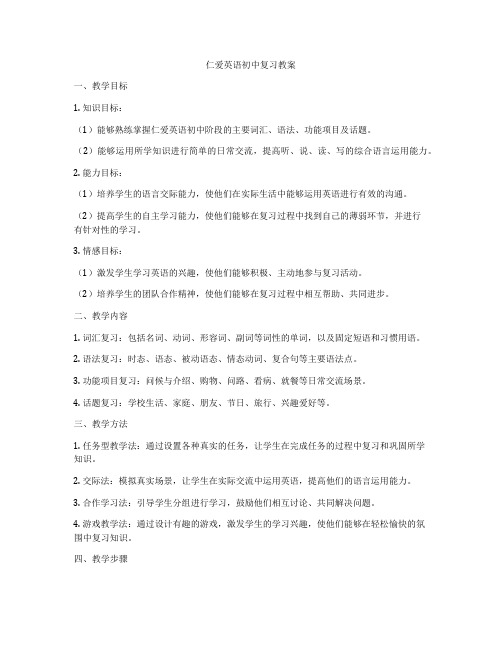
仁爱英语初中复习教案一、教学目标1. 知识目标:(1)能够熟练掌握仁爱英语初中阶段的主要词汇、语法、功能项目及话题。
(2)能够运用所学知识进行简单的日常交流,提高听、说、读、写的综合语言运用能力。
2. 能力目标:(1)培养学生的语言交际能力,使他们在实际生活中能够运用英语进行有效的沟通。
(2)提高学生的自主学习能力,使他们能够在复习过程中找到自己的薄弱环节,并进行有针对性的学习。
3. 情感目标:(1)激发学生学习英语的兴趣,使他们能够积极、主动地参与复习活动。
(2)培养学生的团队合作精神,使他们能够在复习过程中相互帮助、共同进步。
二、教学内容1. 词汇复习:包括名词、动词、形容词、副词等词性的单词,以及固定短语和习惯用语。
2. 语法复习:时态、语态、被动语态、情态动词、复合句等主要语法点。
3. 功能项目复习:问候与介绍、购物、问路、看病、就餐等日常交流场景。
4. 话题复习:学校生活、家庭、朋友、节日、旅行、兴趣爱好等。
三、教学方法1. 任务型教学法:通过设置各种真实的任务,让学生在完成任务的过程中复习和巩固所学知识。
2. 交际法:模拟真实场景,让学生在实际交流中运用英语,提高他们的语言运用能力。
3. 合作学习法:引导学生分组进行学习,鼓励他们相互讨论、共同解决问题。
4. 游戏教学法:通过设计有趣的游戏,激发学生的学习兴趣,使他们能够在轻松愉快的氛围中复习知识。
四、教学步骤1. 热身活动(5分钟):通过播放一首英文歌曲或进行简单的英语游戏,引导学生进入学习状态。
2. 词汇复习(15分钟):以游戏或卡片的形式展示单词,让学生进行认读和拼写练习。
3. 语法复习(20分钟):通过例句和练习题,让学生巩固语法知识。
4. 功能项目复习(15分钟):模拟真实场景,让学生进行角色扮演或小组讨论,运用所学知识进行交流。
5. 话题复习(10分钟):引导学生进行小组讨论,分享彼此的看法和经历,扩大词汇量。
6. 总结与作业布置(5分钟):对本节课复习的内容进行总结,布置适量的作业,让学生巩固所学知识。
仁爱英语中考复习备考计划
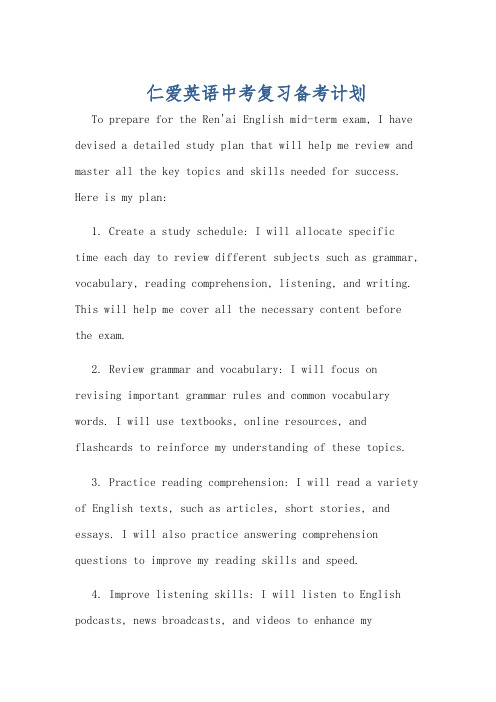
仁爱英语中考复习备考计划To prepare for the Ren'ai English mid-term exam, I have devised a detailed study plan that will help me review and master all the key topics and skills needed for success. Here is my plan:1. Create a study schedule: I will allocate specific time each day to review different subjects such as grammar, vocabulary, reading comprehension, listening, and writing. This will help me cover all the necessary content before the exam.2. Review grammar and vocabulary: I will focus on revising important grammar rules and common vocabulary words. I will use textbooks, online resources, and flashcards to reinforce my understanding of these topics.3. Practice reading comprehension: I will read a variety of English texts, such as articles, short stories, and essays. I will also practice answering comprehension questions to improve my reading skills and speed.4. Improve listening skills: I will listen to English podcasts, news broadcasts, and videos to enhance mylistening comprehension. I will also practice listening to different accents and speech patterns to prepare for the listening section of the exam.5. Enhance writing skills: I will practice writing essays, paragraphs, and letters on various topics. I will focus on organizing my ideas, using appropriate vocabulary and grammar, and structuring my writing effectively.6. Take practice tests: I will take regular practice tests to assess my progress and identify areas that need further improvement. I will analyze my mistakes and work on strengthening my weak areas before the exam.7. Seek help from teachers or tutors: If I encounter difficulties in any subject or topic, I will seek help from my teachers or tutors to clarify my doubts and receive additional guidance.8. Stay motivated and positive: I will maintain a positive attitude towards my studies and stay motivated throughout the preparation process. I will set specific goals for each study session and reward myself for achieving them.通过制定上述复习备考计划,我将全面而有针对性地复习并掌握中考所需的所有重点内容和技能。
仁爱版中考英语备考计划和方法

仁爱版中考英语备考计划和方法English:For the Ren'ai version of the junior high school entrance examination in English, it is essential to have a structured and comprehensive study plan. Firstly, it is important to allocate time each day for English study and practice, which includes listening, speaking, reading, and writing. This can involve reviewing the textbook materials, doing exercises, and using additional resources such as online learning platforms and educational apps. Secondly, it is crucial to identify the specific areas of weakness and focus on improving them. For example, if speaking and listening are challenging, then engaging in conversation practice and listening to English materials regularly can be helpful. Additionally, setting specific goals and deadlines for completing certain tasks or mastering certain skills can be motivating and effective in managing study time. Furthermore, it is beneficial to participate in English language practice outside of the classroom, such as joining English-speaking clubs or finding language exchange partners. Moreover, regularly evaluating one's progress through mock exams and self-assessments can provide valuable insights and help in adjusting the study plan accordingly.Lastly, maintaining a positive and persistent attitude towards learning English is essential to achieving success in the Ren'ai version of the junior high school entrance examination.中文翻译:对于仁爱版中考英语,拟制一份结构化和全面的备考计划至关重要。
初中英语仁爱版总复习计划及思路

初中英语仁爱版总复习计划及思路第一篇:初中英语仁爱版总复习计划及思路九年级英语复习计划漳浦四中黄美莲为了扎扎实实地搞好期末复习,让学生能够把本学期所学的知识真正地融会贯通,根据所教年级学生的实际情况,特制订计划如下:一、指导思想:以课本为本,重读、精讲、精练。
不给学生增加压力,不搞题海战术。
让学生有的放矢地复习。
二、课堂复习步骤。
复习时间短,提高课堂效率尤其重要。
因此,老师要合理安排课堂结构。
我的基本课堂复习结构如下: 第1步:引导学生复习教材。
第2步:教师对重难点进行讲解、比较和区别,启发学生回想、比较、分析和综合归纳,加深对知识的理解。
第3步:精选练习进行操练,使学生做到举一反三,融会贯通。
第4步:系统地概括、总结,帮助学生理清知识脉络,最大限度地使学生对所学知识系统化三、复习措施。
1、精心备课,备课要做到目的明确,重难点突出,充分考虑学生的实际,有针对性。
2、精讲重难点,落实基础知识,查缺补漏。
3、进行模拟训练及技巧讲解,培养应考能力。
初中英语总复习计划及思路漳浦四中黄美莲近几年来,各省市地区在致力于中考英语试题的改革,尤其是本市从去年的中招试题来看,其试题容量大、覆盖面广,要求也愈来愈高,渐渐与高考试题接轨,不仅加强了对英语基础知识的考查,更突出了对运用知识的能力的考查。
我们英语备课组根据近几年中考试题新特点及学生实际情况,采取“三轮复习法”作为毕业班的总复习计划,“三轮复习法”要求先全面学习,后进行重点复习和适应性考试复习。
做到着眼全面,突出重点,点面结合,把全面复习和重点复习有机结合起来。
这样既系统全面又有所侧面的复习,能使学生较好地掌握所学的知识考出优异成绩。
第一轮复习阶段针对学生对已学基础知识,因时间久,部分已遗忘的共性,本着“依纲靠本”和“温故知新”的原则,要求学生一步一个脚印,扎扎实实搞好基础知识的复习。
这一阶段应按教材顺序归纳语言点,讲透语言点运用,对各单元的知识要点进行梳理,同时应注重基础词汇、词组、句型的过关(从近几年中招试题看,逐渐加强词汇、词组的考查)并通过配套练习、复习检测形成能力。
仁爱英语中考总复习计划范文三篇
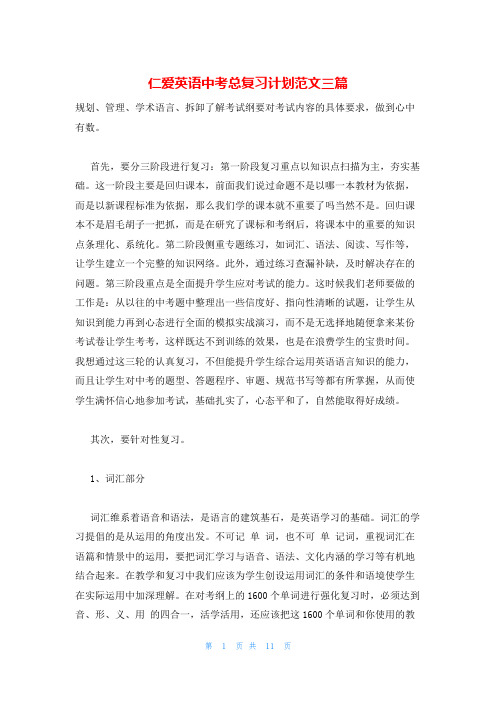
仁爱英语中考总复习计划范文三篇规划、管理、学术语言、拆卸了解考试纲要对考试内容的具体要求,做到心中有数。
首先,要分三阶段进行复习:第一阶段复习重点以知识点扫描为主,夯实基础。
这一阶段主要是回归课本,前面我们说过命题不是以哪一本教材为依据,而是以新课程标准为依据,那么我们学的课本就不重要了吗当然不是。
回归课本不是眉毛胡子一把抓,而是在研究了课标和考纲后,将课本中的重要的知识点条理化、系统化。
第二阶段侧重专题练习,如词汇、语法、阅读、写作等,让学生建立一个完整的知识网络。
此外,通过练习查漏补缺,及时解决存在的问题。
第三阶段重点是全面提升学生应对考试的能力。
这时候我们老师要做的工作是:从以往的中考题中整理出一些信度好、指向性清晰的试题,让学生从知识到能力再到心态进行全面的模拟实战演习,而不是无选择地随便拿来某份考试卷让学生考考,这样既达不到训练的效果,也是在浪费学生的宝贵时间。
我想通过这三轮的认真复习,不但能提升学生综合运用英语语言知识的能力,而且让学生对中考的题型、答题程序、审题、规范书写等都有所掌握,从而使学生满怀信心地参加考试,基础扎实了,心态平和了,自然能取得好成绩。
其次,要针对性复习。
1、词汇部分词汇维系着语音和语法,是语言的建筑基石,是英语学习的基础。
词汇的学习提倡的是从运用的角度出发。
不可记单词,也不可单记词,重视词汇在语篇和情景中的运用,要把词汇学习与语音、语法、文化内涵的学习等有机地结合起来。
在教学和复习中我们应该为学生创设运用词汇的条件和语境使学生在实际运用中加深理解。
在对考纲上的1600个单词进行强化复习时,必须达到音、形、义、用的四合一,活学活用,还应该把这1600个单词和你使用的教材单词进行比较,对有出入的单词应该在教学中补充使用,不至于到后来孤立地强记单词。
另外,对一些音似、形似、意似、极易混淆的词或词组要做特别比较,澄清易混点,处理好常用词汇的搭配和辨析,并配以适当的练习加以巩固。
2024年中考英语备考复习计划模板(4篇)

2024年中考英语备考复习计划模板一、第一轮复习计划初步复习考生主要是打牢基底,把基础巩固好。
那初步的复习任务就是背诵单词,考生可以先不用管那些买的单词书,直接记课本上的单词即可。
此外考生还要以课本为中心,多看重点词汇、短语以及语法。
考生可以按照教材的顺序,进行复习。
去记每个单元的词汇以及词汇的运用,当然要树立好目标,词汇大概要记一千六百多个才行。
二、第二轮复习计划经过了第一轮的复习,相信考生们也能很快适应第二轮复习了。
那第二轮复习考生要注意的事情就更多了,考生要进行全面的复习,包括单词、词性、时态、语法、写作等各个方面。
而且考生不仅是要掌握知识点,更要落实到做题上面,强化训练,提升自己的能力。
因而,考生可以多做一些中考题型,例如阅读理解、完型填空、单项填空、书面表达、词汇运用等等。
在做题的过程中,考生不要为了做题而做题,要把重心放在技巧点拨上。
熟悉各个题型的特点,然后强化分类练习。
如果考生自己复习起来很困难,可以多找老师问一问,主要是好好珍惜课堂上的时间。
三、第三轮的复习计划进行了两轮的复习计划,接下来就是第三轮的复习计划了,第三轮复习计划考生考虑的会更加的多。
而且综合练习以及测试要作为重点。
考生需要做一些中考真题试卷来查漏补缺,那种题型掌握的不好,就需要加大强度去复习。
一般来说,考生第三轮复习必须要做的事情就是听力训练,而到了考前一个月考生甚至每天都要听听力。
另外模拟训练也是必备的,考生要让自己保持那种紧张的状态,好让自己能很快投入到考试中。
当然太紧张了也不行,会影响发挥,因而考前考生也要做好心理辅导。
以上,就是中考英语三轮专项复习计划。
每一轮复习,考生都要定好目标,知道自己该复习什么,这样才能厚积薄发。
希望考生们不辜负自己的努力,拿到一个好成绩。
2024年中考英语备考复习计划模板(二)(一)复习方案:(二)复习原则,教学目标既是教材编写的依据和教学要求的依据,也是考前复习和考试命题的依据。
九年级仁爱英语中考复习教案
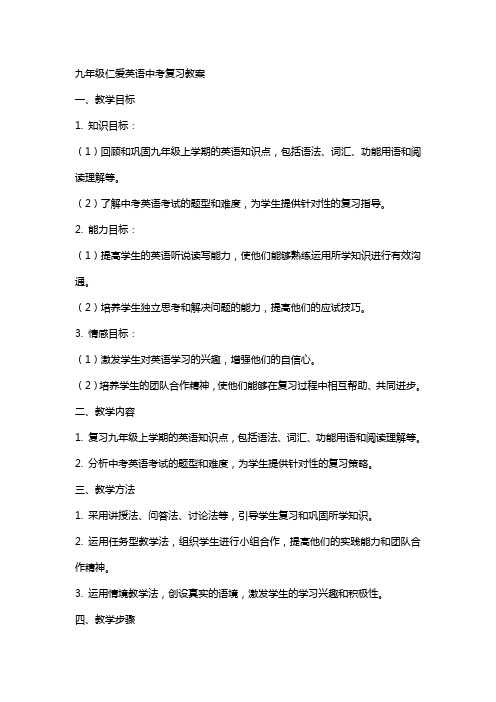
九年级仁爱英语中考复习教案一、教学目标1. 知识目标:(1)回顾和巩固九年级上学期的英语知识点,包括语法、词汇、功能用语和阅读理解等。
(2)了解中考英语考试的题型和难度,为学生提供针对性的复习指导。
2. 能力目标:(1)提高学生的英语听说读写能力,使他们能够熟练运用所学知识进行有效沟通。
(2)培养学生独立思考和解决问题的能力,提高他们的应试技巧。
3. 情感目标:(1)激发学生对英语学习的兴趣,增强他们的自信心。
(2)培养学生的团队合作精神,使他们能够在复习过程中相互帮助、共同进步。
二、教学内容1. 复习九年级上学期的英语知识点,包括语法、词汇、功能用语和阅读理解等。
2. 分析中考英语考试的题型和难度,为学生提供针对性的复习策略。
三、教学方法1. 采用讲授法、问答法、讨论法等,引导学生复习和巩固所学知识。
2. 运用任务型教学法,组织学生进行小组合作,提高他们的实践能力和团队合作精神。
3. 运用情境教学法,创设真实的语境,激发学生的学习兴趣和积极性。
四、教学步骤1. 课前准备:教师整理和准备九年级上学期的英语知识点,制作课件和练习题。
2. 课堂导入:教师简要介绍中考英语考试的题型和难度,激发学生的学习兴趣。
3. 知识点复习:教师引导学生复习九年级上学期的英语知识点,包括语法、词汇、功能用语和阅读理解等。
4. 练习巩固:教师布置练习题,学生独立完成,教师进行讲解和反馈。
5. 小组讨论:学生分组讨论复习策略,分享自己的学习心得和方法。
7. 课后作业:教师布置课后作业,要求学生巩固所学知识。
五、教学评价1. 课堂参与度:观察学生在课堂上的发言和表现,评价他们的学习积极性。
2. 练习完成情况:检查学生独立完成练习题的情况,评价他们的学习效果。
3. 小组讨论:评价学生在小组讨论中的表现,包括表达能力、合作精神和解决问题的能力。
4. 课后作业:检查学生完成课后作业的情况,评价他们的学习成果。
教学反思:本教案旨在帮助学生复习九年级上学期的英语知识点,并为中考英语考试做好准备。
2024中考英语复习备考计划范本(4篇)
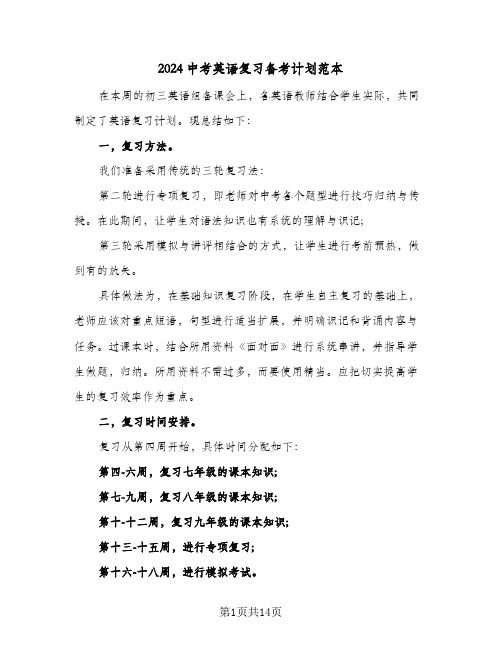
2024中考英语复习备考计划范本在本周的初三英语组备课会上,各英语教师结合学生实际,共同制定了英语复习计划。
现总结如下:一,复习方法。
我们准备采用传统的三轮复习法:第二轮进行专项复习,即老师对中考各个题型进行技巧归纳与传授。
在此期间,让学生对语法知识也有系统的理解与识记;第三轮采用模拟与讲评相结合的方式,让学生进行考前预热,做到有的放矢。
具体做法为,在基础知识复习阶段,在学生自主复习的基础上,老师应该对重点短语,句型进行适当扩展,并明确识记和背诵内容与任务。
过课本时,结合所用资料《面对面》进行系统串讲,并指导学生做题,归纳。
所用资料不需过多,而要使用精当。
应把切实提高学生的复习效率作为重点。
二,复习时间安排。
复习从第四周开始,具体时间分配如下:第四-六周,复习七年级的课本知识;第七-九周,复习八年级的课本知识;第十-十二周,复习九年级的课本知识;第十三-十五周,进行专项复习;第十六-十八周,进行模拟考试。
注:以上时间安排不是一尘不变的,应根据具体情况灵活变通。
三,课堂活动内容与步骤。
每天课后给学生留一定量的“软”作业,即背诵或同学互考。
以致上课学生能够参与进来,而且提高效率。
具体教学步骤如下:(一),从检查学生的“软”作业入手。
(1)考单词“万丈高楼平地起”,不记单词何能学好英语?因而一开课让学生抢拼单词,可迅速让学生进入学习状态,而且可以激发学生的学习兴趣。
因为单词提前记过,不会太难,因而降低了起点,学生易于接受。
(2)考短语让学生用活页纸写短语后互改,可以检测学生的动笔能力并养成及时改错的习惯。
(二),教师讲解。
复习课中切记面面俱到,而应选择重点。
老师在进行了上述考察环节后,基本做到心中有数,对于易错点、易混点和疑难点要进行解释与讲解,直至讲透,让每个学生都掌握为止。
(三)练习巩固。
在老师讲解后最重要的一环是学生进行练习与巩固。
即精选练习题让学生去做,老师巡视时进行适当的辅导。
以上是我们讨论的一些好的做法。
最新仁爱英语初三总复习计划

2020初三下英语教学工作计划一年一度的中考即将来临,众所周知,初三的下半学期是孩子们一生中最重要、最关键的阶段,也可以说这段时期决定了孩子们的前途和命运。
而中考英语成功与否关键在于复习,复习阶段的成功与否也决定着中考英语的成绩。
因此,我深知自己身上的任务很重,责任更重。
但无论怎样辛苦,我都会努力去克服,帮助孩子们顺利地迈出人生这关键的一步。
为使英语教学工作能有条不紊的进行,为今后工作中能取得更好的成绩。
特制定九年级英语教学和复习计划。
一、总体目标1、加强课堂教学改革,真正转变课堂教学方式,提高学生的学习能力,争取把课堂变成学生学习的乐园。
2、做好中考总复习工作,抓好尖子生,提高临界生,盯住所有学生,不让一个学生漏掉,鼓励学生向目标迈进,中考争取稳中有升。
二、遵循原则以纲为纲,以本为本的原则,着重把握中考要求及考试范围,对《课标》和《考纲》要反复研究。
关注学生的全面发展,整体提高;注重双基,夯实基础,强化学生能力。
练习过程中注重精讲精练,精雕细刻,决不漏掉一个知识点。
同时培养学生将所学的词汇、短语、句型、句法应用到实际中,提高日常交际能力,解决实际问题。
三、具体工作措施加强学习,认真学习新课程标准,专研七、八、九年级五本教材,形成固定的知识体系,研究xx和20xx年的考试说明,精选xx和xx年的中考题。
继续大练基本功,提高自己的教学能力。
实行课堂教学改革,创建新型教学模式。
走进学生家庭,走进学生的内心世界,挖掘学生的心理资源,建立新型的师生关系,既是教师,又是家长和朋友。
指导学生如何预习、听课、记笔记、复习、做作业、小结和讨论,帮助学生养成良好的学习习惯。
四、总体复习思路1、按单元复习。
通览初中教材,进行单元知识点扫描。
目的是对基础知识和基本技能进行系统的复习,把好“基础关”;任务是掌握各单元知识结构,全面地复习知识点,完成理解记忆;重点是重视课标要求与教材的基础作用,强化基础知识和基本技能的训练;面向全体,面向基础。
写一篇仁爱版九年级英语复习计划
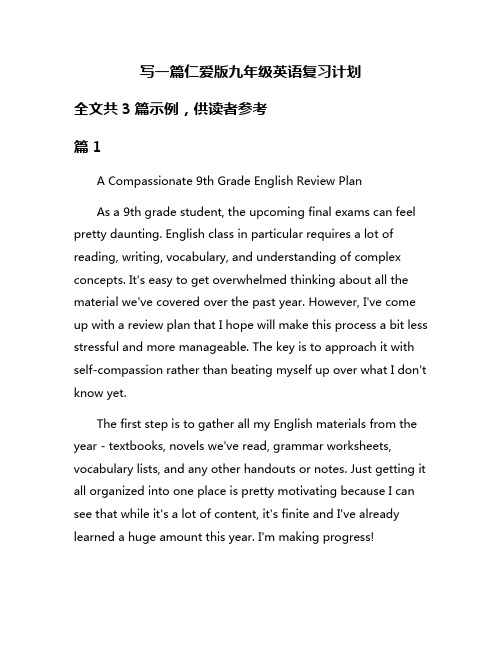
写一篇仁爱版九年级英语复习计划全文共3篇示例,供读者参考篇1A Compassionate 9th Grade English Review PlanAs a 9th grade student, the upcoming final exams can feel pretty daunting. English class in particular requires a lot of reading, writing, vocabulary, and understanding of complex concepts. It's easy to get overwhelmed thinking about all the material we've covered over the past year. However, I've come up with a review plan that I hope will make this process a bit less stressful and more manageable. The key is to approach it with self-compassion rather than beating myself up over what I don't know yet.The first step is to gather all my English materials from the year - textbooks, novels we've read, grammar worksheets, vocabulary lists, and any other handouts or notes. Just getting it all organized into one place is pretty motivating because I can see that while it's a lot of content, it's finite and I've already learned a huge amount this year. I'm making progress!Next, I'll go through and make a big master list of all the major concepts, skills, and readings we've covered. Seeing it all written out will help me get a sense of what areas need the most review. I don't want to overwhelm myself by trying to re-learn everything from scratch. The goal is to strategically identify the highest priorities - grammar concepts I struggled with, reading comprehension skills I need to practice, vocabulary lists I never really mastered, and so on.Once I have my priority areas identified, I'll make a schedule dedicating different days/times to focus on each one. I don't want this to take over my whole life, so I'll be reasonable with how much time I allocate while still allowing enough review. Two hours per day spread over different topics seems manageable while still being meaningful progress. The consistency will be important.For example, maybe Mondays and Wednesdays I'll spend an hour reviewing grammar rules and working through practice exercises. I'll be compassionate with myself if I don't understand a concept right away, and celebrate small wins when I do get things right. I'll spend another hour those days going through fiction reading comprehension strategies and sample passages.Tuesdays and Thursdays, the first hour can be dedicated to vocabulary - making flashcards for words I still don't know, doing activities to reinforce them, and finding way to use them in writing exercises. The second hour, I'll tackle non-fiction reading passages and work on analysis skills.Fridays can focus just on writing practice - spending two hours responding to sample essay prompts, storywriting, or other assignments. Instead of judging myself if early drafts aren't perfect, I'll simply make notes on areas to improve for next time.Weekends I'll take off completely, or maybe just spend an hour or two if I'm feeling really motivated, working on areas I've identified as biggest weaknesses that week.In addition to this self-study, I'll make sure to communicate regularly with my English teacher about any concepts that are still tripping me up during my reviews. Perhaps I can come for office hours or email questions for clarification. I shouldn't be afraid or embarrassed to ask for more support if I need it. My teachers want me to succeed!The key throughout will be to celebrate every tiny step of progress, rather than berating myself for what I don't know yet. I've accomplished so much already this year. If I approach this review process with self-compassion, allowing myself to makemistakes, and simply re-commit to trying again, I know I can keep building my skills and knowledge.English class doesn't have to be about anxiety or shame. It's about unlocking forms of expression, understanding diverse perspectives, and acquiring communication skills that will serve me for life. If I stay motivated through compassion rather than harsh self-judgement, these next few weeks can actually be an opportunity to solidify what I've learned while building confidence for the challenges ahead. I've got this!篇2A Compassionate Plan for Reviewing 9th Grade EnglishAs the new school year fast approaches, the familiar feeling of dread starts to creep in. Summer's lazy days will soon give way to the hustle and bustle of classes, homework, and extracurriculars. For rising 10th graders like myself, the impending year means buckling down and getting serious about our studies, especially when it comes to that pivotalmake-or-break subject - English.I'll be the first to admit that English wasn't exactly my forte in 9th grade. Okay, who am I kidding? It was a total train wreck. Between struggling to analyze those snooze-fest literatureclassics and fumbling through proper grammar rules, I spent most of the year feeling like a fish out of water. My grades were...well, let's just say they left a lot to be desired.But I'm determined to turn things around this year. After all, strong English skills are the key that unlocks so many doors - effective communication, critical thinking, and let's not forget those all-important standardized test scores. So I've devised a comprehensive, yet compassionate, plan to get myself back on track. It's time to stop treading water and finally allow myself to speak the language of success.Step 1) Ditch the DreadLet's be real - part of the reason I struggled so mightily with English last year was a serious case of subject-phobia. Anytime I even thought about diagramming sentences or dissecting dry, impenetrable texts, I instantly worked myself up into a tizzy of anxious dread. This year, I'm going to work on reframing my mindset from one of fear to one of opportunity.English gives me the chance to explore the beauty and complexity of human expression. To analyze how powerful words can inspire emotions and influence the course of history. To use that very same language as a tool of creativity andself-discovery. Once I ditch the perception of English as anarcane code meant only for geniuses, I can embrace it as a vibrant, malleable art form that's as awe-inspiring as it is practical.Step 2) Make Friends with the FundamentalsYou know that coworker who's always making snide remarks about having to attend "basic" training sessions, insisting they've long-since mastered those skills? Yeah, that arrogant mentality did me no favors when it came to bolstering my shaky English fundamentals. This year, I'm going to be the consummate pupil when it comes to grammar, reading comprehension, vocabulary, and the like.I'll review those nitpicky grammatical rules I never quite committed to memory. I'll take practice tests to sharpen my skills in quickly understanding the gist and deeper meaning of passages. I'll make digital flashcards to build up my vocab prowess, turning myself into a walking, talking thesaurus. These fundamental skills may seem basic, but they're the bedrock that all more advanced English success is built upon. No more coasting over the basics - it's time to become best friends with the fundamentals.Step 3) Dive Deep into Quality LitLast year, I treated our assigned literature readings like a chore - a tedious task to be checked off and forgotten about. In doing so, I cheated myself out of the opportunity to really sink my teeth into these rich, substantive works. Whether it was zoning out during class discussions of the texts' deeper themes or skimming the surface by merely going through the motions with my analysis essays, I failed to allow the literature to speak to me on any sort of profound level.But what a shame it is to reduce the potential wisdom and insight of classic literature to mere alphabetical characters on a page! This year, when we dive into works like To Kill A Mockingbird, The Crucible, and The Odyssey, I vow to immerse myself fully. I'll view the readings not as a burden, but as an invitation to explore the complex truths and perspectives woven into them. I'll dig deep in search of those underlying messages about the human condition that have allowed such works to endure for generations. If I open myself up to drinking in the magic of great literature, I'm confident even the mustiest of texts can feel invigoratingly fresh.Step 4) Write From the HeartYou know what makes the perfect partner for deep, engaged reading? Active, impassioned writing. Last year, when it cametime to put pen to paper, my English essays exhibited all the zest and zeal of a court summons. In truth, I treated writing assignments with a checklist mentality - include a thesis, some quotes, a conclusion, and call it a day. While that approach may have technically hit all the assignment criteria, it utterly failed to tap into the well of creativity and critical thinking that writing is meant to nourish.This year, that changes. Whether I'm crafting a rhetorical analysis or an imaginative narrative, I'll write with unbridled authenticity and enthusiasm. I'll let the words flow not from a mindset of fulfilling empty requirements, but from a place of discovering my truth and giving voice to my perspective on the human experience. While meeting logistical criteria will still be important, I won't let that overshadow writing's higher purpose. With heart-felt passion as my muse, I can transform writing assignments from obligatory to extraordinary.Step 5) Find Joy in the JourneyAt the end of the day, a plan is only as good as one's willingness to implement it with consistency and vigor. That's why the most integral component of my English revival plan for the new year is to bring a spirit of joy and engagement to the entire process. I'll seek out opportunities for rewardingintellectual discourse by actively participating in class discussions. I'll turn to literature's life-giving pages not just for academic enlightenment, but for soulful fulfillment and creative inspiration as well.I'll relish in the possibilities of the English language itself - its ability to persuade, its cadences and rhythms, its evolution over time. Where past me might have tried to white-knuckle my way through English out of a sense of grim obligation, this year I'm going to fully lean into the romanticized notion of English as a passionate love affair. An all-consuming exploration of the final frontier - the depths of human expression and consciousness. Only then can the subject matter transcend the status of academic obligation and become something immeasurably more meaningful.At the end of the day, a little humility, perseverance, and passion for the art form can go a long way. While my 9th grade English experience was undeniably rocky, I refuse to let that narrative define me. This year, armed with a compassionate, holistic game plan, I fully expect to turn my English troubles into a tale of transcendence and success. Wish me luck!篇3A Compassionate 9th Grade English Review PlanAs I approach the end of 9th grade and look ahead to summer break, I can't help but feel a mix of excitement and trepidation. On one hand, the freedom of those long, lazy days stretching out before me is thrilling. No more waking up at the crack of dawn, rushing through homework, or stressing about tests and quizzes. Just pure blissful relaxation.On the other hand, I know that if I completely check out over the summer, I'll likely return to 10th grade in the fall feeling rusty and behind. All that hard-earned knowledge and skill from 9th grade English could start slipping away without any consistent practice and review. And getting back up to speed next year is bound to be really tough.That's why this summer, I'm determined to create and stick to a smart, sustainable English review plan - one that allows me to thoroughly reinforce what I've learned while still leaving plenty of room for fun summer activities and much-needed downtime. But this review strategy needs to be about more than just rote memorization and dry drills. It has to engage my brain in a deeper, more meaningful way.After all, at its core, English class is about developing crucial communication skills, expanding our cultural literacy, andcoming to a richer understanding of the human experience through literature, writing, and analysis. It's about learning how to articulate our thoughts and ideas with clarity and nuance. And above all, it's about cultivating empathy, compassion, and wisdom by walking a mile in the shoes of others through the study of diverse perspectives and narratives.So my review plan this summer needs to reflect those bigger-picture goals that go far beyond just acing the next test or getting a good grade. It should be an opportunity for further intellectual growth, creative exploration, and hopefully, some insightful self-discovery along the way.With that aspirational vision in mind, here's mymulti-pronged plan for an enriching, productive, yet still laidback 9th grade English summer review:Reading, Reading, and More ReadingThere's no better way to maintain and strengthen my literacy skills than by continually engaging with well-written,thought-provoking texts over the summer months. To that end, I'll aim to read at least 6-8 books, including a few classics or important works of contemporary literature that I may have missed during the school year.For example, I could finally dive into beloved novels like To Kill a Mockingbird, The Kite Runner, or The Book Thief - powerful stories that will no doubt expand my cultural literacy and understanding of issues like racism, social injustice, and the impacts of war. Or I could explore highly-acclaimed recent works that offer eye-opening perspectives, like The Hate U Give, Born a Crime, or There There.Whatever the specific titles, I'll make sure to thoughtfully engage with each book. That means not just breezing through the pages but really unpacking the themes, analyzing the characters and their motivations, reflecting on the writer's craft, and considering how the narratives intersect with my own views and life experiences. I may even start a virtual book club with a few friends to discuss the works I'm reading.Creative Writing ExercisesWhile reading great literature is vital, I don't want to neglect actively sharpening my own writing skills over the summer as well. The blank page can feel intimidating, but creative writing exercises can help make the process feel considerably less daunting while pushing me to stretch my imaginative muscles.For instance, I could commit to completing one short creative writing prompt each week based on different genres,styles, characters, or even random hypothetical scenarios. One week, I might attempt a moving personal memoir piece. The next, maybe a suspenseful short story or a whimsical poem or song lyrics exploring abstract concepts like love, grief, or hope.The key is to simply flex my creative writing capabilities through consistent lower-stakes practice, rather than putting too much pressure on myself to produce a polished masterpiece each time. Just getting words flowing onto the page - and maybe even sharing some of my drafts with friends or family for feedback - can go a long way in building skills and confidence as a writer.Grammar "Game" DaysOkay, I'll admit it - diagramming sentences and drilling grammar rules isn't exactly my idea of a fun summer activity. In fact, it sounds pretty much torturous. However, I also recognize that having a solid command of grammar, syntax, and language mechanics is critical for effectively communicating my ideas in both writing and speech.So rather than outright ignoring this crucial area over summer break, my plan is to dedicate one day each week (let's call it "Grammar Game Day") specifically to grammar study andpractice - but to try making it as interactive and, dare I say, entertaining as possible.For instance, rather than simply reading dusty old grammar textbooks, I could turn to gamified apps, websites, or YouTube channels that take more of an engaging, multimedia-driven approach to concepts like parts of speech, subject-verb agreement, pronoun usage, and so on. I may even be able to find cool team grammar games or quizzes that I could do with my friends virtually to combine learning with some friendly competition.The goal is to take the boring, monotonous edge off of grammar drills by tapping into more novel, stimulating digital study resources and activities. That way, I can sneak in some linguistic fine-tuning without it feeling like a total slog.Literature Analysis & DiscussionIn addition to grammar practice, setting aside time for substantive literary analysis and discussion will help ensure I return to 10th grade English feeling razor sharp. This could take the form of selecting two or three short stories, plays, poems, or novel excerpts each month to thoroughly deconstruct and analyze through the lenses of:• Rhetorical devices and figurative language• Themes and symbolic motifs• Historical/cultural context• Author's purpose and potential real-world inspirations• Application to current events or my own life experiencesI may even record myself working through these literary analyses via video blogs or mini-podcasts that I could share with classmates or my 10th grade English teacher for feedback. Or I could hop on video chat study sessions with peers to have more of a lively Socratic debate around our differing interpretations and perspectives on the works.The act of digging into these texts will not only reinforce my close reading and analytical skills but also provide ample opportunity to flex my spoken and written communication abilities. It will be like an engaging master class in literary criticism - with the added bonus of potentially discovering new personal revelations and forging deeper human connections through the examination of these resonant stories and characters.Time for Rest & ReflectionHowever, as crucial as all of these review methods may be, I also have to be intentional about setting aside ample downtime over the summer months. This isn't just about vegging out watching Netflix all day (though some well-deserved vegging will definitely be involved!). It's about creating space for unstructured personal reflection - time to pause, breathe, and take stock of where I've been and where I hope to go.I could spend mornings journaling about my thoughts, feelings, and experiences. Or days getting out in nature, hiking, and allowing my mind to wander. Or even just lazilycloud-gazing in the backyard, daydreaming about my evolving sense of purpose and any attitudes, values, or perspectives that may be shifting within me.This soul-nourishing respite is just as integral to the compassionate approach of my 9th grade English review plan as all the reading, writing, and studying components. Because at the end of the day, the true essence of English class isn't just developing technical aptitudes but cultivating wisdom, emotional intelligence, and deeper self-awareness - the intangible assets that will serve me indefinitely in this life, no matter which path I may travel.So while I absolutely plan to put in the hard work reinforcing crucial skills over the summer through diverse literacy activities, I also am going to be extremely intentional about pacing myself and prioritizing self-care, mindfulness, and personal growth. It's all about striving for balance and nurturing my sense of intellectual curiosity while not succumbing to burnout.In that spirit of balance and compassion, this multidimensional 9th grade English review game plan is about so much more than just checking boxes or scrambling to get ahead for next year. It's a blueprint for an enriching summer experience that marries consistent learning with ample room forself-discovery, creativity, and moments of restorative pause.That's what will truly set me up for success come fall - not just maintaining key English skills but fortifying that deeper drive for understanding, open-mindedness, and lifelong learning that will serve me far beyond my high school years. With this review strategy in place, I can return to 10th grade feeling refreshed, empowered, and wholeheartedly invigorated about my continued journey in the English language arts.。
仁爱英语中考总复习计划范文
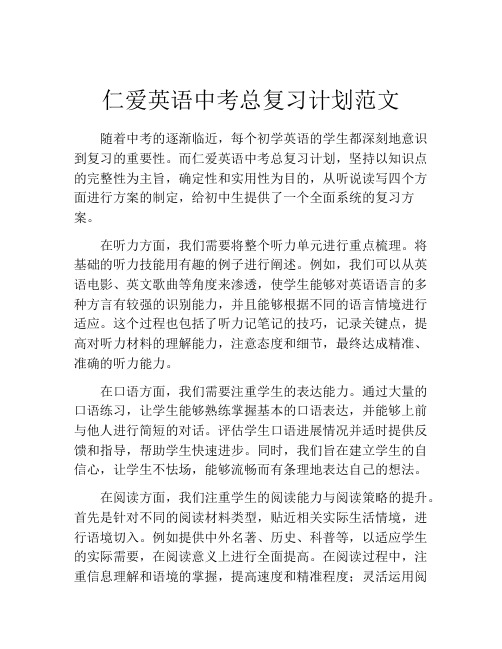
仁爱英语中考总复习计划范文随着中考的逐渐临近,每个初学英语的学生都深刻地意识到复习的重要性。
而仁爱英语中考总复习计划,坚持以知识点的完整性为主旨,确定性和实用性为目的,从听说读写四个方面进行方案的制定,给初中生提供了一个全面系统的复习方案。
在听力方面,我们需要将整个听力单元进行重点梳理。
将基础的听力技能用有趣的例子进行阐述。
例如,我们可以从英语电影、英文歌曲等角度来渗透,使学生能够对英语语言的多种方言有较强的识别能力,并且能够根据不同的语言情境进行适应。
这个过程也包括了听力记笔记的技巧,记录关键点,提高对听力材料的理解能力,注意态度和细节,最终达成精准、准确的听力能力。
在口语方面,我们需要注重学生的表达能力。
通过大量的口语练习,让学生能够熟练掌握基本的口语表达,并能够上前与他人进行简短的对话。
评估学生口语进展情况并适时提供反馈和指导,帮助学生快速进步。
同时,我们旨在建立学生的自信心,让学生不怯场,能够流畅而有条理地表达自己的想法。
在阅读方面,我们注重学生的阅读能力与阅读策略的提升。
首先是针对不同的阅读材料类型,贴近相关实际生活情境,进行语境切入。
例如提供中外名著、历史、科普等,以适应学生的实际需要,在阅读意义上进行全面提高。
在阅读过程中,注重信息理解和语境的掌握,提高速度和精准程度;灵活运用阅读策略,如略读、速读、扫描等技巧,培养学生的快速阅读能力,为理解较长文本打下坚实基础。
在写作方面,我们的计划着重于两个方面:写作技巧的提升和语言能力的加强。
在提升写作技能方面,我们会通过逐步的练习,培养学生基本的写作规范,如文章格式、写作逻辑结构、语言规范等,从而使学生在写作过程中能够有差错的失误,并且越来越勇于尝试不同的文章类型与技法;在语言能力方面,我们将注重学生的词汇量与表达能力,通过丰富多样的课程教学和作业布置,培养他们的创新性思想。
综上所述,仁爱英语中考总复习计划是一种能够帮助初中学生全面提升英语的系统化复习方案,可有效地提高听说读写的能力,帮助学生最大化地发挥自己的潜力,提高语言思维的准确性和自信能力,帮助学生迎接中考的挑战。
仁爱英语中考备考方案

本学期是整个九年义务教育的最后⼀个学期,学⽣即将⾯临中考。
在教学中帮助学⽣理解,吸引吃透教材。
对教材中的知识进⾏内化,即进⾏综合,应⽤,创新和中考思维的升华,把书本知识变成学⽣⾃⼰的知识。
让他们取得更好的成绩。
⼀.本校现状分析本校九年级共⼋个班级,由五位英语教师担任英语教学⼯作,从整体来看,学⽣成绩不太理想。
部分学⽣底⼦薄,基础差。
根据上学期期末全旗会考成绩来看,本校参考学⽣共510⼈,其中优秀学⽣54⼈,中等⽣181⼈,低分⼈数164⼈。
这些学⽣分布在各班,每位任课教师都有全⾯掌握。
对于这些偏科的学⽣要加强指导。
由于学困⽣很多,要想提⾼整体成绩,必须抓好学⽣困⽣⼯作。
⼆.教材分析七年级上册:Unit1:1.⼈称代词,物主代词的⽤法;2.基数词的读法、写法、⽤法3,be动词am is are 与主语的搭配。
4 了解⼀般疑问句,陈述句否定句的结构。
5. 本单元重点短语和句型Unit2:1熟练掌握并运⽤has have 的⼀般现在时的各种句式。
2⼈称代词物主代词,名词所有格的同法。
3初步了解不定冠词的a an 的⽤法,4掌握名词复数的'构成及⽤法,特别是不规则名词复数。
5. 本单元重点短语和句型Unit3:1、⼈称代词主格与宾格的⽤法与区分。
2、⼀般现在时助动词do 与does的⽤法。
3、would like 的⽤法。
4. 本单元重点短语和句型Unit4:1、some 与any 的⽤法。
2、基数词的写法3、可数名词的复数与不可数名词的表达法4、时间的表达法5. 本单元重点短语和句型1七年级下册:Unit5:1.⼀般现在时态,学习谈论交通⽅式和⽇常活动频度的句型2.⼀般现在时的⼀般疑问句及其肯定和否定回答,复习⽇常活动和频度副词seldom和never等。
3. 本单元重点短语和句型Unit6:1. There be 句型2. 学习问路指路句型3. 初步学习启使句4. 介词短语5. 谈论交通规则,交通标志。
仁爱英语中考复习教案

仁爱英语中考复习教案教案标题:仁爱英语中考复习教案教学目标:1. 通过本节课的复习,学生能够回顾和巩固中考英语的重点知识和技能。
2. 帮助学生提高英语听说读写的能力,为中考做好准备。
教学内容:1. 语法复习:时态、被动语态、虚拟语气等。
2. 词汇复习:常见词汇、短语和固定搭配。
3. 阅读理解:针对中考题型进行相关阅读训练。
4. 听力训练:针对中考听力题型进行相关听力训练。
5. 写作训练:写作技巧和常用句型的复习。
教学步骤:Step 1: 语法复习1. 复习各种时态的用法和句型转换。
2. 复习被动语态的构成和用法。
3. 复习虚拟语气的用法和句型。
4. 练习相关语法题目,巩固学生的语法知识。
Step 2: 词汇复习1. 复习常见词汇和短语。
2. 复习常见固定搭配和熟语的用法。
3. 练习相关词汇题目,提高学生的词汇运用能力。
Step 3: 阅读理解1. 给学生发放一篇中考样题的阅读材料。
2. 学生独立阅读材料,并回答相关问题。
3. 分组讨论答案,并进行解析和讲解。
Step 4: 听力训练1. 播放一段中考样题的听力材料。
2. 学生听力理解并回答相关问题。
3. 分组讨论答案,并进行解析和讲解。
Step 5: 写作训练1. 复习写作技巧和常用句型。
2. 给学生发放一篇中考样题的写作题目。
3. 学生独立完成写作任务,并互相交流修改。
教学辅助手段:1. 中考样题的相关教材和练习册。
2. 多媒体设备,用于播放听力材料。
教学评估:1. 通过语法、词汇、阅读、听力和写作的练习,评估学生对中考相关知识的掌握程度。
2. 通过学生的课堂表现和讨论参与度,评估学生的学习态度和合作能力。
教学延伸:1. 鼓励学生利用课余时间进行更多的中考复习和练习。
2. 提供相关的学习资源和辅导材料,帮助学生进行自主学习和巩固。
注:此教案仅供参考,教师可根据实际教学情况和学生的特点进行适当的调整和修改。
- 1、下载文档前请自行甄别文档内容的完整性,平台不提供额外的编辑、内容补充、找答案等附加服务。
- 2、"仅部分预览"的文档,不可在线预览部分如存在完整性等问题,可反馈申请退款(可完整预览的文档不适用该条件!)。
- 3、如文档侵犯您的权益,请联系客服反馈,我们会尽快为您处理(人工客服工作时间:9:00-18:30)。
英语九下学习计划
九年级英语组
如何将初中三年所学的英语知识在考前的三个月内进行全面, 系统的复习,提高复习效率,获得好的复习
效果,是摆在初三毕业生面前的现实问题,也是每位毕业班任课教师教研究探讨的一项重要课题。
我们把自 己的复习计划与时间安排在此与大家共同交流探讨。
2014217----2.28
( Unit5 — Unit6 ))新授课 第一轮(3.3---5.3 ):重点复习课本。
在这一阶段我们计划按教材顺序归纳语言知识点,讲透语言知识
点的运用,各单元的知识要点进行梳理,所以我们九年级英语组一致商量:将课本上已经学过的知识 内容打印成试卷的形式发给学生,其内容包括:重点单词、短语、句型;重要语言点,考点;语法知 识概括等。
要
求学生认真扎实的复习,应注重基础词汇、词组、句型的过关。
(可以通过老师检测小组长,小组长检测组
员的方式),然后老师根据情况再提示归纳考点知识点,后留一定的时间让学生消化理解。
同时,老 师要观察大多数学生易错的是哪些题型,做一总结,再次讲解。
我们这样上课使学生从不会的知识弄 懂了,会的知识更加牢记,从零散知识的学习自然过渡到知识的系统归纳上,使基础知识更加条理化, 切实搞好基础知识的复习。
通过这一阶段的复习,使学生在脑海中形成一棵知识树,形成一个网络, 为下一步复习打下坚实的基础。
主要内容
时间 七年级上下册
八年级上册
八年级下册
在这一阶段复习中要做到:让学生做适量的难度适中的练习;
及时检测,即每复习完一部分后, 上中午辅 导期间要经行检测(可通过提问、默写、听写的办法),及时了解学生对所复习知识的掌握情况。
利用早读 时间再次加强背诵。
老师要对学生总结不完整的知识点,加以补充完整;对学生易错的知识点,让学生练、 考;对学生模棱两可的知识点,
就要精讲细讲。
在每单元的知识归纳总结上, 注意学生激发学生的发散思维, 3.3--3.11 3.12--3.26 3.27--4.13 九年级Unitsl-2
九年级Units3-4
九年级 Units5-6 4.14- 4.21 4.22- 4.29 4.30 —5.3
让他们做到“系统复习,整体把握,综合运用”。
第二轮(5.3-5.23 ):是专项训练的复习阶段。
重点是语法知识及题型全解,如词类分为:冠词、代词、
介词、连词、动词、数词、形容词和副词等;动词的时态(初中要求八种时态)和动词的主动被动语
态;还有句子的种类等。
而中考题型:完形填空、阅读理解,词语运用、补全对话,书面表达等,每个专项我们都
要涉及,让学生建立一个完整的知识网络。
每天,我们至少要抽出3-5分钟的时间,来听写,训练学生听力。
此外,通过练习查漏补缺,及时解决存在的问题。
另外,我们要对历年中考题型及考点进行强化训练。
从中考题型来看,注重的是考查听、读、写的能力。
而相对来说,我们学生最容易失分的题型就是完
形填空和阅读理解,所以这一部分我们要视为重中之重。
对完形填空、阅读理解的考查,不仅要求学生掌握所学的词汇
和语法知识,还要求学生结合文章大意掌握对其进行综合运用的能力。
要进行专门性的操练。
我们精选试题,
进行强化训练,并要求学生在规定的时间内完成,使学生达到一定的熟练程度,提高学生的阅读理解能力,同时也提高学生的答题速度。
所以在第二轮复习中加强有目的、有计划地分类阅读训练,帮助学生熟悉不同
体裁文章结构的特点和设题手法,掌握一些阅读的解题技巧(如进行必要的逻辑推理和联想;利用构词法、反义词或定义猜测新词义等)。
同时还要增加生活常识,关注热点事件,注重学科间综合知识积累,以达到理解语境、强化语篇和跨文化意识的目的,提高阅读水平。
第三轮(5.24-5.31 ):综合训练。
经过前两阶段的复习,这时候我们要做综合性的训练。
我们采用九地市试卷,通过做题,老师评讲,引导学生系统、完整地掌握知识,扎实、有效地提高综合能力。
让学生对所复习的知识重新整理,查漏补缺。
做到精心设计的综合练习,彻底消除学生的模糊意识,强化考点,并做到触类旁通。
让学生互相阅卷,开展讨论,不懂的或不清楚的问题再由老师最后定夺,加深印象。
模拟考试(6.1--6.16 ):要选择听力、笔试为一体的成套试题,题目要求难易适中,没有偏题,要
有新意,具有指导性和实战性,进行模拟考试,要求学生在规定时间内答题。
针对考场要求、答题方式等,对学生进行应考、应试技巧的训练,培养学生的临场发挥能力和应变能力,对于学生的答题速度、准确度、灵敏度、字体、格式、标点符号都要把关。
总之,复习课是繁重的,但它是教学的一个重要环节,复习课的好坏,决定中考的胜败。
这就要求我们老师复习时要讲究方法,踏踏实实,认真的去做,必须有方向性、目的性、归纳性、系统性和灵活性。
同时,作为毕业班的老师,我们
还要充分掌握学生当前心理,进行心理疏通,这样学生才能轻装上阵,在最短的时间内达到最好的复习效果。
通过复习不仅提升学生综合运用知识的能力,而且学生心理上的压力也会得到调节,考试时定会充满信心,相信一定会考出优异的成绩!。
